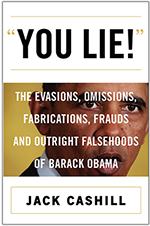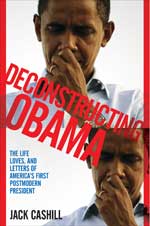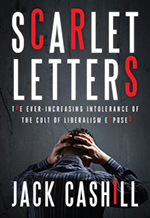Baseball Still Thrills Emotionally Invested Fans, Especially In Postseason Play [COMMENTARY]
Why Baseball Still Works
Order Jack Cashill's newest book,
Scarlet Letters
___
Get your copy of Jack Cashill's book, "You Lie!"

___
Get your copy of Deconstructing Obama

___
Jack Cashill's book:
Hoodwinked: How Intellectual Hucksters have Hijacked American Culture
© Jack Cashill
HNGN.com - November 10, 2015
 Having watched sixteen baseball games this October (and November), fourteen of them from beginning to end, I have come to understand why baseball still works.
Having watched sixteen baseball games this October (and November), fourteen of them from beginning to end, I have come to understand why baseball still works.
I begin, however, with one caveat: baseball only works if you care. If you care a lot, no sport works better. If you don’t much care, any other sport works better, even soccer.
Every NFL game is watchable. So is every Sunday on the PGA tour. But for all of baseball’s retro charm or its Jungian appeal to the psyche, if you don’t care who wins, the whole sport is a snooze.
For about twenty or so years, my hometown team, the Kansas City Royals, made it very hard to care. In none of those years did the outcome of a game matter after June 1. In many of those years, the outcome did not matter after May 1.
As I have relearned in recent years, caring hurts. So with the Royals down to the Astros four runs in the fourth and possibly final game of this year’s ALDS, I braced myself for the pain by leaving my office and sharing my grief at a neighborhood bar.
Like myself, none of my new bar buddies had given up hope. Just a year earlier, in the Royals’ first post-season game in 29 years, the team entered the eight inning of the wild card game down four runs to Oakland and won in the twelfth. Watching that game in a Los Angeles hotel bar, I and two hitherto unknown guys from KC cheered maniacally while the rest of the patrons looked at us like we were small-market nut jobs, which, in fact, we were.
That game reminded me of one of baseball’s intrinsic virtues. A football team down four touchdowns in the fourth quarter plays a reckless, self-defeating catch-up game against the clock. In baseball, there is no clock. If anything, a team plays more prudently when down four runs. Every pitch counts, every base runner matters, and time is not an issue.
Sure enough, the Royals scored five runs in the eighth to beat the Astros and force a game five in the ALDS. As I posted on my Facebook page, “Superficial though it may be, there are few moments of pure joy comparable to sitting at your neighborhood bar during a workday watching your hometown team overcome a 4-run deficit in the 8th inning.”
Skipping ahead, the Royals found themselves down once more heading into the eighth in the fourth game of the World Series against the New York Mets. The Mets had pounded the Royals the night before and convinced their haughty hometown fans—Bill Maher, Chris Rock, Michael Moore, Seinfeld et al.—that the two losses in KC were a fluke.
Sure enough, the Royals scored three in the top of the eighth to take a two-run lead going into the bottom of the ninth. This brought up another baseball moment that has no equivalent in any other sport--the exquisite, excruciating drama of the final inning. Unlike any other sport, every baseball game that matters ends as climactically as last year’s shocking Patriot win in the Super Bowl.
Time placed no more restraints of the Mets than it did the Royals. Scarily, the Mets put runners on first and second base with one out against the Royals’ closer Wade Davis. A double would have tied the game. A homerun would have won it in a walk-off for the Mets.
Instead, the Mets’ Lucas Duda lined into a game-ending double play. Watching with my family, we all literally jumped out of our seats in relief and started high-fiving each other as though the $400,000 World Series bonus was coming our way.
In game five, the Royals again found themselves down, this time by two runs heading into the ninth. Lorenzo Cain led off against Mets’ ace Matt Harvey on the verge of a rare, complete-game shut out. To the uncaring observer, Cain’s multiple foul balls must have seemed tedious. To us, each one represented a heroic struggle to extend the count.
Eventually, Cain worked Harvey to a full-count and then walked. We cheered. Eric Hosmer doubled him home. We cheered wildly. The Mets brought in their ace reliever, Jeurys Familia. Mike Moustakas’s ground out advanced Hosmer to third, one out. We argued.
We argued about the coach’s decision a year ago in the ninth inning of the seventh game of the World Series to hold Alex Gordon at third after a two-out double and outfield error gave Gordon a shot at scoring the tying run. History and precedent add a flavor to baseball no other sport enjoys.
As a catcher during my own humble career, I know hard it is to make a tag at the plate. I argued that Hosmer should come home on just about anything, just as Gordon should have come home a year earlier. The odds were better than expecting the next batter to get a hit off the opponent’s ace. A minute later, Hosmer did just that, sliding home safely after Salvador Perez’s grounder to third and Duda’s errant throw to the plate.
The Royals exploded in the twelfth for five runs, and we held our collective breaths through the bottom of the twelfth knowing that if the Royals could score five runs in an inning so could the Mets.
As history records, they did not, and we partied like it was 1985.*
(* The one year the Royals won the World Series, a year every school kid knows. Almost no one could tell you the year the Chiefs won the Super Bowl.)



